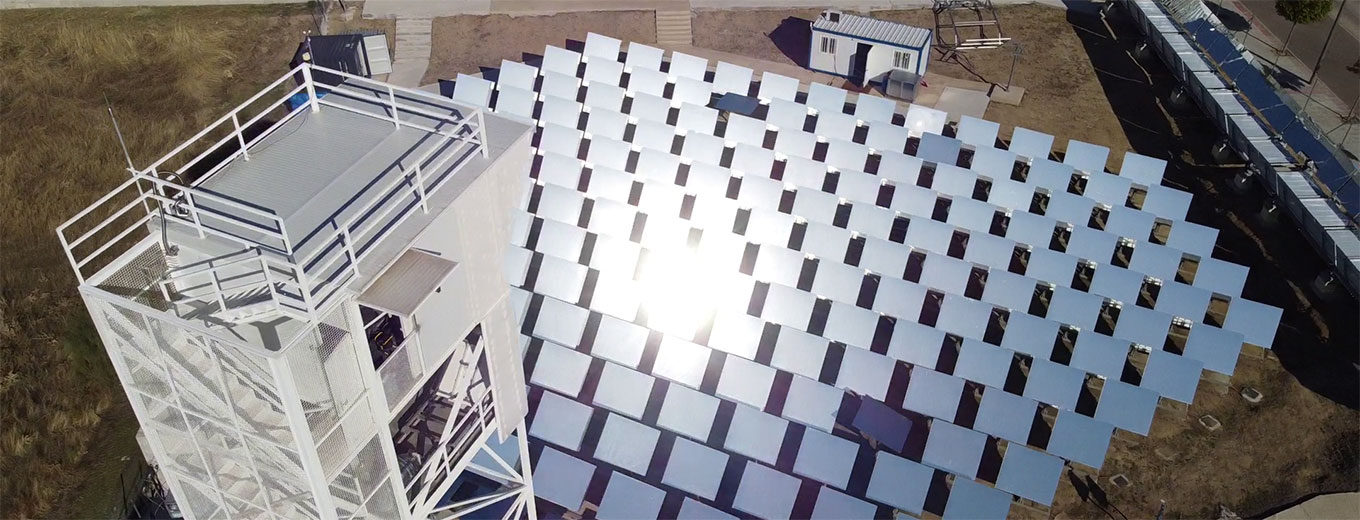In November 2021, a Consortium of ETH Zurich and partners won the 22nd Energy Globe World Award with the SUN-to-LIQUID project.
The SUN-to-LIQUID project, which is funded by the European Union (EU) under Horizon 2020 and by the Swiss State Secretariat for Education, Research and Innovation (SERI), won in the category “fire”, dedicated to projects on sustainable energy technologies. The project joins leading European research organisations and companies in the field of solar thermochemical fuel research, namely ETH Zurich, IMDEA Energy, DLR, Abengoa, HyGear Technology, Bauhaus Luftfahrt e.V. and ARTTIC. SwissCore had the opportunity to talk to Prof. Aldo Steinfeld (ETH Zurich) and Dr. Philipp Furler (CEO and Founder of Synhelion). Synhelion is the spin-off company from ETH Zurich that now commercialises the SUN-to-LIQUID technology. The award ceremony took place during the COP26 Conference in Glasgow.
The SUN-to-LIQUID project had its kick off in January 2016 and ended in December 2019. The project contributes to the EU energy roadmap for 2050, which aims at a 75% share of renewables in the gross energy consumption. The objectives of the project include the design, fabrication, and experimental validation of a large-scale, complete solar fuel production plant. The SUN-to-LIQUID approach uses concentrated solar energy to synthesise liquid hydrocarbon fuels from H2O and CO2. The 22nd Energy Globe World Award was given to the project because it is breaking new ground and has developed the technology for producing renewable – so-called “drop-in” – fuels based on solar energy.
The SUN-to-LIQUID opens new opportunities to protect the global environment. Compared to conventional fossil-derived jet fuel, the net CO2 emissions to the atmosphere can be reduced by more than 80%. In addition, since the solar-driven process relies on abundant feedstock and does not compete with agricultural land, it can thus meet the future fuel demand at a global scale without the need to replace the existing worldwide infrastructure for fuel distribution, storage, and utilisation. The technological demonstration of the project has important implications for the transportation sectors, especially for the long-haul aviation and shipping sectors, which are strongly dependent on liquid hydrocarbon fuels and are difficult to decarbonise.
SUN-to-LIQUID is a great success story regarding not only the renewable energy sector, but also the close collaboration between European partners and a Swiss Institution spearheading the project. This collaboration was realised thanks to the co-funding by the EU under Horizon 2020 and by the Swiss SERI.
Prof. Steinfeld highlights the great benefits of the collaboration between research institutions and industrial partners, which led to large-scale experimental demonstrations. This is only one of the benefits the EU funding programme bestowed on the SUN-to-LIQUID project. Dr. Furler further mentions the importance of Swiss participation in EU research programmes to find diverse European partners and to profit from network effects. He mentions the importance of the EU funds to make the project more attractive for European partners and make the collaboration easier.
Besides the mentioned benefits, the following key innovations are expected from the SUN-to-LIQUID. Firstly, it has developed an advanced modular solar concentration technology for high-flux/high-temperature applications. Secondly, the modular solar reactor technology and high performance redox materials, both developed at ETH Zurich, allow for the thermochemical production of syngas from H2O and CO2 at field scale and with high selectivity, stability, mass conversion, and energy efficiency. Prof. Steinfeld describes the value of the project as the technological demonstration of the entire process chain for the production of solar kerosene from H2O and CO2 in a solar tower. Solar kerosene can help in particular to make long-haul aviation sustainable. In the meantime, the commercialisation of the SUN-to-LIQUID technology is already on its way. Synhelion holds exclusive licenses to bring the technology to the market. The company will build the first industrial-scale solar fuel plant in 2022 and start fuel production in 2023. Synhelion aims to produce about 875 million litres of fuel per year, which could cover about half of Switzerland’s jet fuel demand and make a substantial contribution to reach Switzerland’s decarbonisation goals.
See the SUN-to-LIQUID project video here.

